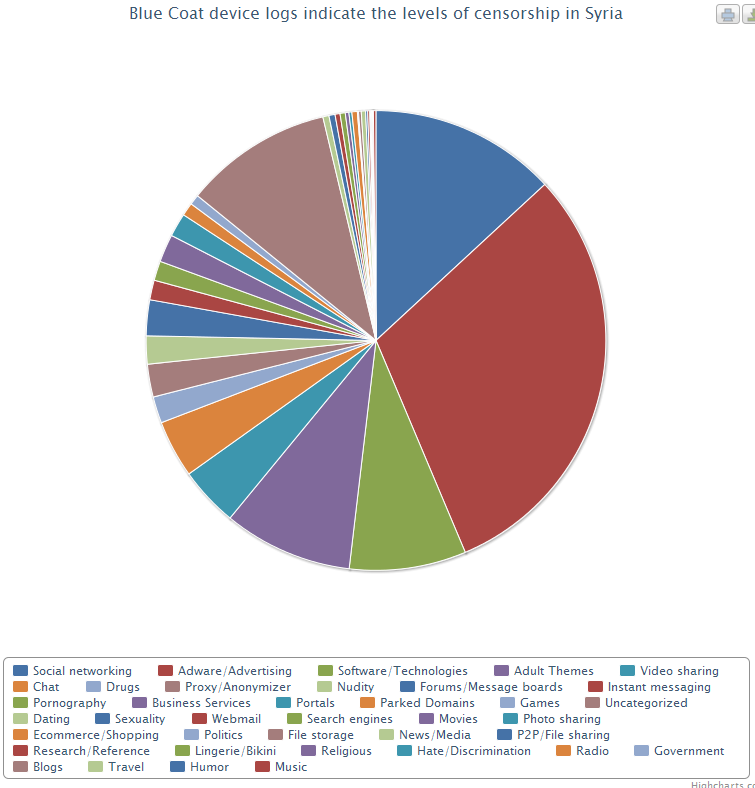This article was written by Leila Nachawati on 10 October 2011.
In the context of repression in the Middle East and North Africa, surveillance technology has played a key role in providing authoritarian regimes with the tools necessary to track citizens online. Among these companies, BlueCoat has proved to be the most efficient in helping the Syrian regime control every movement of Syrians on the Internet.
Every movement of Syrians online is monitored
On October 5, Telecomix collective released 54 Gigabytes of log files taken from Syrian BlueCoat devices that cover the period from 22nd of July to 5th of August, 2011. Bluecoat, an American company, produces proxy devices, tools that offer web caching, virus scanning, and content filtering. Such devices can also be used to conduct surveillance.
The logs released by Telecomix show that the Syrian Telecommunications Establishment has been using Bluecoat devices in order to filter and monitor HTTP connections in the country. BlueCoat has denied selling products to the Syrian regime before, as sales to Syria are not authorised as a result of US trade embargoes, but these logs prove that BlueCoat products have been used as the main technology for surveillance in Syria, perhaps through resellers located in neighboring countries.
Following the Telecomix release, BlueCoat did not respond to direct enquires about the sale of their products to the Syrian government. After multiple attempts, a company spokesperson protested they: do not sell technology to Syria.
This graphic by researcher Arturo Filastò shows the entries that are most requested and blocked in different parts of the country. The logs show that the majority of blocked sites relate to software, advertising, social media, and search engines, as well as some pornographic and other adult content, some of which may have been included by default. Included in the list of blocked sites are Islamsyria.com, Islammemo.cc; Muhammadanism.org and Ikhwanonline.com, which show the Syrian regime’s obsession with Muslim narratives, but also TourismEgyptonline and Myvisapassport.com, which provide info on obtaining visas to get out of the country.
According to Tor researcher Roger Dingledine: the release shows that when people in Syria have used Tor, the websites they visit don not show up in these logs. Because of the dangers posed by this level of surveillance, he strongly recommends all Syrians use Tor. He added: The surveillance hasn not stopped just because we found these logs. So if you do not want to be in these kind of lists you need to use a privacy tool like Tor.
A risky release
Telecomix, which defines itself as a guerrilla informational warfare group, has helped people in Syria and other countries in the region with censored and monitored web access. With this release, they aimed to allow access to anyone who wishes to analyze the files to provide a deeper insight on Syrian censorship and create more knowledge to circumvent further attacks on freedom of expression. But is this the right way to achieve that? Telecomix states that subscribers personal IP addresses have been stripped off to protect their privacy, but also note that some personal data are still present in the requested URLs. According to researcher Jacob Appelbaum, publishing the data is risky. The data was probably already in the hands of the ones wanting to harm the Syrian population but after this release, we can bet that if they did not have a copy, they will now. Publishing an analysis of this data without revealing info on the specific users would have been safer. Syrians are apparently being killed for posting criticisms of Assad on Facebook pages – the authorities will stop at nothing to suppress criticism.
There is clearly a direct relationship between filtering and surveillance technology like BlueCoat and the tracking, arrest, torture and killing of potential opponents in Syria. According to Jillian C. York from the Electronic Frontier Foundation, we have seen few changes in respect to the sale of surveillance and filtering tools to authoritarian regimes by companies based in the United States and other democratic countries. With the death toll reaching 3000 according to some sources, and tens of thousands arrested, tortured and disappeared, this release is just further proof of the surveillance Syrians are exposed to every minute of their lives, and the implication of Western technology in this surveillance.






